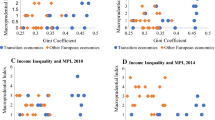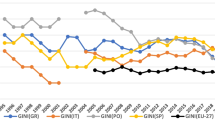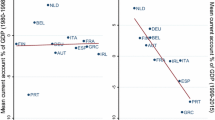Abstract
Three decades before the Great Recession (the 2008 financial and economic crisis) were marked by the continuous growth of current account imbalances and income inequality. This period of high globalization is accompanied by financial liberalization and an increase in trade openness. The empirical investigations of the causes of global imbalances show that growing income inequalities are worsening the current account. After the fall of the Berlin Wall, new EU member states experienced an increase in trade openness accompanied by current account deficits and financial liberalization, but also an increase in income inequality. The Great Recession led to a decrease in imports in these countries and an improvement in the current account. The goal of our research is primarily to examine the relationship between income inequality, current account, and economic openness in the new EU member states. We show that rising income inequality linked with financial liberalization is connected with the deterioration of the current account in new EU member states. Financial liberalization relates to an increase in household domestic debt, contributing to a deterioration of the current account.
Similar content being viewed by others
Notes
Domestic consumption is no longer bound by national income restrictions since foreign savings have become more affordable. Greater credit opportunities based on domestic and foreign savings permit individuals to retain a high quality of living, thus enabling low-income individuals to engage in deficit spending to reach the 'lifestyle gap' that separates them from wealthier groups (Levine et al. 2010). The practice of 'keeping up with the Joneses' increased poor households' debt relative to their income (Van Treeck 2014).
References
Adem AS (2023) Distributional effect of import shocks on British local labour markets. Oxf Econ Pap. https://doi.org/10.1093/oep/gpad008
Angel S, Bittschi B (2018) An integrated view on trends in consumption and income inequality in europe over the last two decades. https://www.semanticscholar.org/paper/An-Integrated-View-on-Trends-in-Consumption-and-in-Angel/f2ec2eb8063bb4d91068f9f8512b380d0904274e
Ascione F, Schnetzer M (2022) Out of balance? Revisiting the nexus of income inequality, household debt and current account imbalances after the Great Recession. Camb J Econ 46(1):133–165. https://doi.org/10.1093/cje/beab044
Autor DH, Dorn D, Hanson GH (2013) The China syndrome: Local labor market effects of import competition in the United States. Am Econ Rev 103(6):2121–2168. https://doi.org/10.1257/aer.103.6.2121
Behringer J, Van Treeck T (2018) Income distribution and the current account. J Int Econ 114:238–254. https://doi.org/10.1016/j.jinteco.2018.06.006
Bumann S, Lensink R (2016) Capital account liberalization and income inequality. J Int Money Finance 61:143–162. https://doi.org/10.1016/j.jimonfin.2015.10.004
Caballero RJ, Farhi E, Gourinchas PO (2008) An equilibrium model of “Global Imbalances” and low interest rates. Am Econ Rev 98(1):358–393. https://doi.org/10.1257/aer.98.1.358
Dollar D, Kraay A (2004) Trade, growth, and poverty. Econ J 114(493):F22–F49. https://doi.org/10.1111/j.0013-0133.2004.00186.x
Dorn F, Fuest C, Potrafke N (2022) Trade openness and income inequality: new empirical evidence. Econ Inq 60(1):202–223. https://doi.org/10.1111/ecin.13018
Fabrizio S, Leigh D, Mody A (2010) The second transition: Eastern Europe in perspective. Five years of an enlarged EU. Springer, Berlin, Heidelberg, pp 191–220
Freund C (2021) Combating inequality: rethinking policies to reduce inequality in advanced economies. In: Blanchard O, Rodrik D (eds) Combating inequality: rethinking government’s role. The MIT press, Cambridge, pp 146–155
Furceri D, Loungani P (2015) Capital account liberalization and inequality (SSRN Scholarly Paper ID 2727188). Soc Sci Res Netw. https://doi.org/10.2139/ssrn.2727188
Galbraith JK (2012) Inequality and instability: a study of the world economy just before the great crisis. Oxford University Press. Oxford https://doi.org/10.1093/acprof:osobl/9780199855650.001.0001
Gräbner C, Heimberger P, Kapeller J, Springholz F (2021) Understanding economic openness: a review of existing measures. Rev World Econ 157(1):87–120. https://doi.org/10.1007/s10290-020-00391-1
Gu X, Tam PS, Zhang Y, Lei CK (2019) Inequality, leverage and crises: theory and evidence revisited. World Econ 42(8):2280–2299. https://doi.org/10.1111/twec.12806
Gu X, Lei C, Sheng L, Zhao Q (2020) Global current account imbalances and the link between income and consumption inequality. Rev Int Econ 29(3):557–572. https://doi.org/10.1111/roie.12520
Gygli S, Haelg F, Potrafke N, Sturm J-E (2019) The KOF globalisation index – revisited. Rev Int Organ 14(3):543–574. https://doi.org/10.1007/s11558-019-09344-2
Iacoviello M (2008) Household debt and income inequality, 1963–2003. JMCB 40(5):929–965. https://doi.org/10.1111/j.1538-4616.2008.00142.x
Iscan T (2010) How much can Engel’s Law and Baumol’s disease explain the rise of service employment in the United States? B. e. J. Macroecon. 10(1):1–43. https://doi.org/10.2202/1935-1690.2001
Jaumotte F, Lall S, Papageorgiou C (2013) Rising Income Inequality: Technology, or Trade and Financial Globalization & quest. IMF Economic Review, 61(2): 271–309. https://econpapers.repec.org/article/palimfecr/v_3a61_3ay_3a2013_3ai_3a2_3ap_3a271-309.htm
Kim DH, Lin SC (2011) Nonlinearity in the financial development–income inequality nexus. J Comp Econ 39(3):310–325. https://doi.org/10.1016/j.jce.2011.07.002
Kumhof M, Rancière R, Winant P (2015) Inequality, leverage, and crises. Am Econ Rev 105(3):1217–1245. https://doi.org/10.1257/aer.20110683
Kumhof M, Lebarz C, Ranciere R, Richter A, Throckmorton N (2012) Income Inequality and Current Account Imbalances. IMF Working Papers. https://doi.org/10.5089/9781463930578.001
Law SH, Tan HB, Azman-Saini WNW (2014) Financial development and income inequality at different levels of institutional quality. Emerg Mark Financ Trade 50(sup1):21–33. https://doi.org/10.2753/REE1540-496X5001S102
Levine AS, Frank RH, Dijk O (2010) Expenditure cascades (SSRN Scholarly Paper ID 1690612). Soc Sci Res Netw. https://doi.org/10.2139/ssrn.1690612
Levine MR (2021) Finance, growth, and inequality. IMF Working Paper No. 2021/164
Li H, Zou H (2011) Savings and income distribution. In CEMA Working Papers. No. 487; CEMA Working Papers. China Economics and Management Academy, Central University of Finance and Economics
Obstfeld M, Rogoff K (2009) Global imbalances and the financial crisis: products of common causes, No 7606, CEPR Discussion Papers, C.E.P.R. Discussion Papers
OECD (2011) Divided we stand: why inequality keeps rising. Organisation for economic co-operation and development. https://www.oecd-ilibrary.org/social-issues-migration-health/the-causes-of-growing-inequalities-in-oecd-countries_9789264119536-en
Ostry JD, Loungani P, Berg A (2019) Confronting inequality: how societies can choose inclusive growth. Columbia University Press, New York
Perugini C, Pompei F (2015) Income distribution. In: Holscher J, Tomann H (eds) Palgrave dictionary of emerging markets and transition economics. Palgrave Macmillan, London, pp 458–476
Perugini C, Hölscher J, Collie S (2016) Inequality, credit and financial crises. Camb J Econ 40(1):227–257. https://doi.org/10.1093/cje/beu075
Rajan R (2010) Fault lines: how hidden fractures still threaten the world economy [Economics Books]. Princeton University Press, Princeton
Stiglitz J (2009) The global crisis, social protection and jobs. Int Labour Rev 148(1-2). https://doi.org/10.1111/j.1564-913X.2009.00046.x
Van Treeck T (2014) Did inequality cause the US financial crisis? J Econ Surv 28(3):421–448. https://doi.org/10.1111/joes.12028
Funding
This research did not receive any specific grant from funding agencies in the public, commercial, or not-for-profit sectors.
Author information
Authors and Affiliations
Corresponding author
Ethics declarations
Competing interests
The authors declare that they have no potential conflicts of interest (financial or non-financial).
Additional information
Responsible Editor: Harald Oberhofer.
Publisher's Note
Springer Nature remains neutral with regard to jurisdictional claims in published maps and institutional affiliations.
Appendices
Appendices
Rights and permissions
Springer Nature or its licensor (e.g. a society or other partner) holds exclusive rights to this article under a publishing agreement with the author(s) or other rightsholder(s); author self-archiving of the accepted manuscript version of this article is solely governed by the terms of such publishing agreement and applicable law.
About this article
Cite this article
Cota, B., Erjavec, N. & Jakšić, S. Income inequality, economic openness and current account imbalances in new EU member states. Empirica 51, 403–423 (2024). https://doi.org/10.1007/s10663-024-09606-2
Accepted:
Published:
Issue Date:
DOI: https://doi.org/10.1007/s10663-024-09606-2
Keywords
- Current account
- Income inequality
- Economic openness
- Financial liberalization
- Panel data
- Feasible generalized least squares




